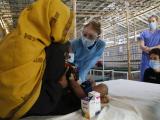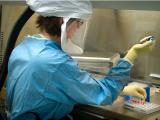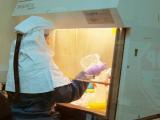Aug 26, 2008 (CIDRAP News) –US Navy and Air Force officials recently reported a suspension of work in their biodefense laboratories to allow a thorough review of safety procedures, following the Army's announcement in early August that it would review security measures at the lab that housed the work of the late Bruce E. Ivins, whom federal officials believe played a role in the 2001 anthrax attacks.
The FBI's Aug 6 announcement of its conclusion that Ivins was responsible for the attacks came 9 days after he apparently committed suicide. Ivins had worked at the US Army Medical Research Institute of Infectious Diseases (USAMRIID) for years, doing research that included work on anthrax vaccines. Shortly after the 2001 attacks he had also helped the FBI analyze anthrax samples, according to media reports.
The FBI's allegations about Ivins raised questions about how secure the USAMRIID facility was. , Reports of Ivins' past mental health problems also prompted questions about how well lab employees are screened before they are cleared to work with bioterror agents.
Officials from the Navy and Air Force said they were temporarily stopping shipments of bioterror agents coming in and out of their research facilities, according to an Aug 22 report from the Associated Press (AP). The stoppage will allow the military branches to review safety rules, including how they are shipped through civilian delivery services such as Federal Express.
Navy and Air Force authorities also told the AP that they wouldn't allow their employees to work with "select agents" unless they enroll in a special program that allows them clearance or their work is supervised by another employee who is enrolled in the program.
Commander Jeff A. Davis, a Navy spokesman, told the AP that Navy Secretary Donald Winter had ordered the suspension and review to ensure safe handling of biologic material at its five labs, which are located in the United States, Peru, Egypt, and Indonesia.
Air Force spokesman Maj Richard Johnson said the Air Force was also reviewing its biodefense lab systems because of the same safety and security concerns, the AP reported.
Other military biodefense labs include six in the Army and two in the Air Force.
The Army also froze shipments in and out of its labs from Aug 8 to 14, which allowed it to review and strengthen some of its security protocols, according to the AP report.
A few days after the FBI released its conclusions about Ivins' involvement with the anthrax attacks, the Army appointed a team of medical and military experts to review security protocols at USAMRIID, according to an Aug 8 AP report. Army spokesman Paul Boyce said at least a dozen military and civilian officials have been asked by Army Secretary Pete Geren to analyze safety measures, quality controls, and other policies and practices.
The same day the Army assembled its review team, two lawmakers announced they were expanding their congressional investigation into risks associated with the nation's biodefense labs, according to an Aug 9 report from the Los Angeles Times. Rep. John D. Dingell (D-Mich.), chairman of the House Committee on Energy and Commerce, and Rep. Bart Stupak (D-Mich.), who heads the group's subcommittee on oversight and investigations, said they would investigate personnel security at USAMRIID.
The two congressmen also sent a letter to President Bush asking the administration to order its own inquiry concerning biodefense labs, according to the AP report.
According to the Times report, Dingell said in a statement, "I'm deeply troubled by allegations raised about security at one of our nation's premier labs handling some of the deadliest germs in the world. Our nation is at serious risk if one of our government's most prominent scientists could have a decade-long battle with mental illness without anyone noticing."
Meanwhile, W. Russell Byrne, a colleague of Ivins' who led USAMRIID's bacteriology division from late 1998 to early 2000, said he worried that the findings implicating Ivins have damaged USAMRIID and other government research labs, the AP reported on Aug 7. He said he was also concerned that the disclosures would hurt the Army's plan to replace its 38-year-old building with a larger laboratory that is to be part of the National Interagency Biodefense Campus at Fort Detrick, Md.
The interagency lab, which is under construction, will also house lab facilities for the National Institute of Allergy and Infectious Diseases (NIAID) and the Department of Homeland Security (DHS).
Pat Fitch, lab director for the DHS lab, which is set to open next year, said officials hope to finalize safety rules by February and will ask the Centers for Disease Control and Prevention (CDC) to review them, the Frederick, Md., News Post reported yesterday.
Clifford Lane, director of NIAID's clinical research division, also said the agency was working on its safety and security rules for the new lab, according to the News Post report.
DHS and NIAID officials said some of the security measures under consideration include video surveillance and two-man rules that prohibit researchers from working in labs alone.
See also:
Aug 15 CIDRAP News story "FBI conclusions in anthrax probe meet skepticism"
Oct 4, 2007, CIDRAP news story "House committee airs safety concerns about biodefense labs"
Background information on National Interagency Biodefense Campus




















